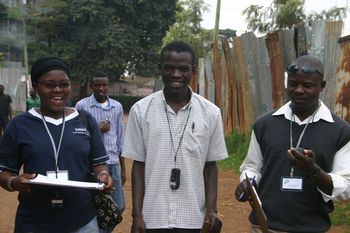Id:Mapping projects

Mapping projects merupakan upaya kolaboratif oleh orang-orang dengan minat tertentu, yang mana mungkin ingin memetakan sutau wilayah ataupun untuk meningkatkan/memperbaiki kualitas pemetaan untuk topik-topik tertentu/khusus. Ada beberapa project pada sebagian besar negara di dunia dan pada beberapa wilayah khusus; terdapat pula beberapa project yang berhubungan/berkaitan dengan pengembangan aplikasi/software dan pelayanan/jasa yang berkaitan dengan OpenStreetMap.
List of territory based projects
See the List of territory based projects for information on mapping in virtually every country. Follow the links to more localised mapping down to the region and city level.
Special interest topics
- See also the Features category
There are communities within OpenStreetMap interested in mapping many different features. See the Features category for an introduction to mapping many different types of feature. Interest areas include:
- Accessibility: accessibility (mapping for inclusive accessibility using OpenStreetMap for various groups, including the blind (see OSM for the blind), routing for people in wheelchairs (see wheelchair routing)
- Borders and administrative boundaries: WikiProject United Nations political boundaries and WikiProject Import WDB are project focused on importing information about political boundaries between countries and territories from UN sources and from the CIA World Database.
- Humanitarian relief: The humanitarian OpenStreetMap team coordinates the creation, production and distribution of free mapping resources to support humanitarian relief efforts in many places around the world. There will be many projects including WikiProject Haiti and 2011 Sendai earthquake and tsunami.
- Development partners: OpenStreetMap development partners lets international development and humanitarian organizations list point people that are working on OpenStreetMaps for better visibility and coordination.
- Infrastructure: At the heart of OSM is information about the road network (see Highways), railways (use Railways for a tagging introduction) and WikiProject Metro systems to find out about the project to map the world's metro systems. And then there is WikiProject Power networks which focuses on mapping the electric and gas distribution and generation systems.
- Marine and shipping: The OpenSeaMap project collects and adds information needed for navigation at sea including locations of lighthouses and details of harbours, and display it together with bathymetric data, weather charts and other dynamic data fo all water sport enthusiasts like sailors, divers, canoeists.
- Nature, conservation and environment: People in the environmental OSM project are active in adding information relevant to conservation of natural resources and habitats as well as important cultural heritage (see Conservation). Also waterways and WikiProject Corine Land Cover (which is about importing land cover/use information for Europe).
- Places of worship: WikiProject Latter-day Saints (mapping places of worship)
- Recreation/leisure: There are many groups mapping information relevant to different outdoor activities, including hiking, winter sports, WikiProject Whitewater maps, and IOF mapping (which is about creating orienteering sport maps).
- Collaborations: Wikipedia (interoperation with Wikipedia includes more than 1.7 MiB of data linking to Wikipedia-articles displayed in the map).
- Translation: There are several aspects of Translation in OpenStreetMap, including place names in the map itself. This is mostly coordinated under List of territory based projects but we also have WikiProject Esperanto and WikiProject Catalan
- Special Populations: These include ethnic groups or geographical areas with unique characteristics, such as Native American reservations in the United States. Though Native American reservations, which tend to be highly rural, are included in TIGER data in the United States, typically the data is incomplete or inaccurate. Lately, tribes have taken matters into their own hands and have created their own data. This also is true in other parts of the world.
Technical projects
- WikiProject Cleanup (managing and improving this wiki)
- WikiProject Pictograms (creating and improving icons used on maps, particularly icons for point features)
- WikiProject Semantics (improving terms, classifications and ontologies used within OpenStreetMap)
- Routing (tagging to support routing by many transport modes)
- Indoor Mapping (mapping the interiors of buildings and structures)
See also
- Local contacts (contact people in various countries)
- Local chapters (branches of the OpenStreetMap Foundation in different territories)
- Research (research into the OpenStreetMap project and use of OpenStreetMap in education)